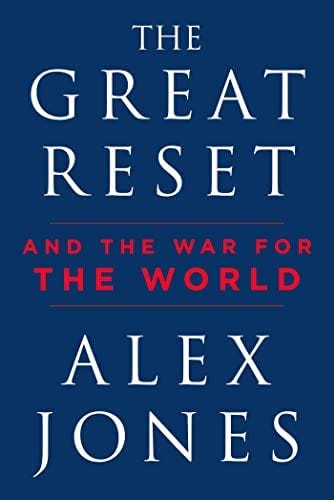The Great Reset and the War for the World
Alex Jones (New York: SkyHorse Publishing | Simon & Schuster, 2022)
If your only knowledge of Alex Jones is what you’ve learned from the corporate media outlets who criticize him as a “conspiracy kook” or “unhinged far-right extremist,” or what you’ve seen from online clips of his various rants, you might be surprised to learn that he is a very well read and informed political commentator. Jones isn’t unhinged, but passionate. He isn’t crazy, but angry at collective political groups who think they operate in whatever way they want and not be held accountable. He isn’t a “doomer,” but saddened by the apparent blindness and passivity of most people in the West who can’t see what is happening before their very eyes, or who see it and don’t want to do anything about it. Consider this, if you would: If you knew a crime was happening, that the criminals involved arrogantly boasted about planning and getting away with their crime, and that only a small number of people were actually trying to stop the crime from happening, how would you feel?
Alex’s frustration is, on reflection, very understandable. However, it can be off-putting to people who are used to consuming media reporting that is carefully crafted — from diction cadence, and from vocal delivery and gesticulations — to make them feel safe, effectively rendering many of them docile. So how can one get the information Alex has been providing about “the Great Reset” [formerly known as “the New World Order”] on his radio shows, video reports, and documentaries to people who would otherwise not want to listen to an “unhinged, far-right conspiracy theorist”? Point them to Alex Jones’ new book The Great Reset and the War for the World.
In Jones’ new book, he explains what the Great Reset is (ch.1), how its system of control developed (ch.2), the parties who are responsible for the great reset and its system of control (ch.3), the role COVID-19 plays in the outworking of the Great Reset plan (ch.4), the significance of Yuval Noah Harari (ch.5), the digital gulag (ch.6), the Great Reset of Energy (ch.7) and Food (ch.8), how the Great Reset founders and promoters are currently trying to formulate a narrative to convince you of their plans (ch.9), and then ends his book by pointing the reader to the explicit statements made by those involved in forming, promoting, and bringing about the Great reset (ch.10).
Jones’s book relies heavily upon citations from the sources themselves, or from the mainstream media that tries to discredit his information as “conspiratorial” or “unhinged.” It also manages to speak to a wide audience without sacrificing the amount of information that is communicated to the reader. It is informative and serious, without being dull, dry, and depressing. If you are looking for a good intro to the Great Reset that is accessible to a wide ranging audience, this is the book for you.
—h.



